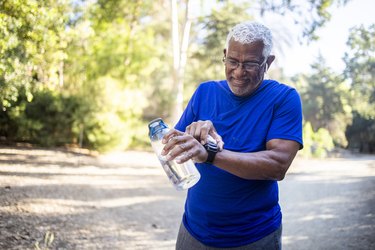
There's no bones about the fact that your risk for sustaining a debilitating fracture increases with age.
"Bone health is important at all stages of life. It takes on more significance as people age because strength and bone density are generally not maintained as we get older," says Minisha Sood, MD, a board-certified endocrinologist at Northwell Lenox Hill Hospital in New York City.
Video of the Day
Video of the Day
That can lead to low bone mass and set the stage for osteoporosis, a bone disease marked by porous, less-dense bones that can raise the risk for bone fractures, notes the Bone Health & Osteoporosis Foundation (BHOF).
Not every factor leading to osteoporosis can be changed. But understanding how the condition develops can help you control the culprits that can be managed, so you can keep your bones healthy as you get older.
What Causes Osteoporosis?
We all gradually lose bone mass as we age. When a person has osteoporosis, this bone mass loss happens even faster, to the point where the structure of their bone tissue starts to change.
The causes that lead to osteoporosis are complex. While changes related to aging are often the driver, other factors that can become more likely as we get older can also come into play.
The hormones estrogen and testosterone help keep bones healthy and strong, but they tend to decline as we age, which can affect bone health.
For this reason, people who go through menopause can experience rapid bone loss during this time of life, Dr. Sood says.
2. Certain Health Conditions
Some health problems can affect your bones and increase the chances for osteoporosis. These include rheumatoid arthritis (RA), some cancers, HIV/AIDS, anorexia nervosa and other endocrine or gastrointestinal diseases, according to the National Institute of Arthritis and Musculoskeletal and Skin Diseases (NIAMS).
These conditions can affect anyone, but some, like RA and cancer, become more common with age.
3. Medication Use
Some medicines can weaken your bones, especially if you take them long-term, the BHOF says. These include:
- Aluminum-containing antacids such as Alamag
- Antiseizure medicines (only some) such as Dilantin or Phenobarbital
- Aromatase inhibitors (sometimes used to treat breast cancer) such as Arimidex, Aromasin and Femara
- Chemotherapeutic drugs used to treat cancer
- Cyclosporine A and FK506 or Tacrolimus (immunosuppressive drugs used after organ transplants but also sometimes used to treat autoimmune conditions like RA or psoriasis)
- Gonadotropin releasing hormone (GnRH) such as Lupron and Zoladex (used to treat conditions including prostate cancer, endometriosis and uterine fibroids)
- Heparin (a blood thinner)
- Lithium (used to treat certain mental health conditions like bipolar disorder)
- Medroxyprogesterone acetate for contraception (Depo-Provera)
- Methotrexate (used to treat RA, psoriasis and some cancers)
- Proton pump inhibitors (PPIs) such as Nexium, Prevacid and Prilosec
- Selective serotonin reuptake inhibitors (SSRIs) such as Lexapro, Prozac and Zoloft
- Steroids (glucocorticoids) such as cortisone and prednisone
- Tamoxifen (premenopausal use)
- Thiazolidinediones such as Actos and Avandia (used to manage type 2 diabetes)
- Thyroid hormones in excess
Talk with your doctor if you take one of these medications and are worried about your bone health. The benefits of the drug may outweigh the potential risks to your bones. But in some cases, you may be able to switch treatments or make an adjustment to your dose to lower your fracture risk.
Other Risk Factors for Osteoporosis
Certain people are at higher risk for osteoporosis. Here are some more things that can increase your chances for bone problems:
- Race or ethnicity. White and Asian women are more likely to get osteoporosis compared to women of other races or ethnicities, per the Cleveland Clinic.
- Nutrient deficiencies: Over time, consistently falling short on calcium and vitamin D can cause bones to be weaker and increase the chances for osteoporosis, Dr. Sood notes.
- Bone structure. Being thin or petite can increase the odds for osteoporosis, because smaller-framed people have less bone to lose in the first place, per NIAMS.
- Family history. Having parents or grandparents with osteoporosis can up your chances, the Cleveland Clinic notes.
- Activity level. A sedentary lifestyle can cause your bones to lose density at a faster rate, according to NIAMS.
- Smoking and drinking. Both tobacco use and alcohol use can negatively affect bone health and make osteoporosis more likely, Dr. Sood says.
5 Ways to Keep Your Bones Strong as You Age
Though you can't turn back the hands of time, there are plenty of things you can do to keep your bones as sturdy as possible and help prevent osteoporosis naturally.
1. Eat Calcium-Rich Foods
Your bones store roughly 98 percent of the calcium in your body. Getting your fill of bone-supporting nutrients like calcium is the number-one way to help them stay healthy and strong, Dr. Sood says.
Adults under 50 need 1,000 milligrams of calcium each day; once you're 50 or older, you need 1,200 milligrams, per the Academy of Nutrition and Dietetics.
You can find calcium in foods like:
- Milk or fortified soy milk
- Yogurt
- Cheese
- Dark leafy greens like kale or spinach
- Soybeans or edamame
- Calcium-fortified tofu
- Beans
- Calcium-fortified foods like breakfast cereal and orange juice
2. Pay Attention to Other Bone-Healthy Nutrients
While calcium is the biggest bone-health player, your body also relies on vitamin D, vitamin K, potassium, and magnesium to build strong bones.
The best way to get your fill of each? Eat a variety of wholesome, nutrient-dense foods like fruits and vegetables, whole grains, lean proteins, nuts and beans.
3. Consider Asking Your Doctor About a Supplement
Calcium supplements can help you meet your needs if you're struggling to get enough of the mineral from food alone. But a tablet or chew may not deliver the same benefits as a calcium-rich diet, so talk with your doctor about the pros and cons.
"Calcium-rich foods are best," Dr. Sood says, because they often come packaged with other compounds and nutrients that can help your body absorb the mineral.
4. Get Moving
Any activity that puts stress on your bones can help slow bone density loss and even spur the growth of new bone, per Harvard Health Publishing. That includes walking, dancing, jogging, weight-lifting or higher-impact sports like tennis or basketball.
Just keep in mind that these activities only strengthen the bones that get used. Walking and jogging help the bones in your lower body, for instance, but they won't affect your arm or wrist bones.
5. Quit Smoking and Watch Your Alcohol Intake
As we've noted, tobacco and alcohol use can be bad for your bone health.
If you're struggling with quitting smoking, talk to your doctor about ways to kick the habit. If you drink, stick to no more than a drink or two per day.
When to See a Doctor
It's never too early to talk to your doctor if you have concerns about your bone health, especially if you have a history of calcium or vitamin D deficiency or have taken medications that can compromise your bone health.
If you have a family history of osteoporosis or hip fracture, you should start the conversation as you approach perimenopause, Dr. Sood says, which typically begins in your early or mid-40s.
- Bone Health & Osteoporosis Foundation: "What is Osteoporosis and What Causes It?"
- National Institute of Arthritis and Musculoskeletal and Skin Diseases: "Osteoporosis"
- Cleveland Clinic: "Osteoporosis"
- Academy of Nutrition and Dietetics: "Understanding Osteoporosis"
- Harvard Health Publishing: "Slowing bone loss with weight-bearing exercise"
Is this an emergency? If you are experiencing serious medical symptoms, please see the National Library of Medicine’s list of signs you need emergency medical attention or call 911.


